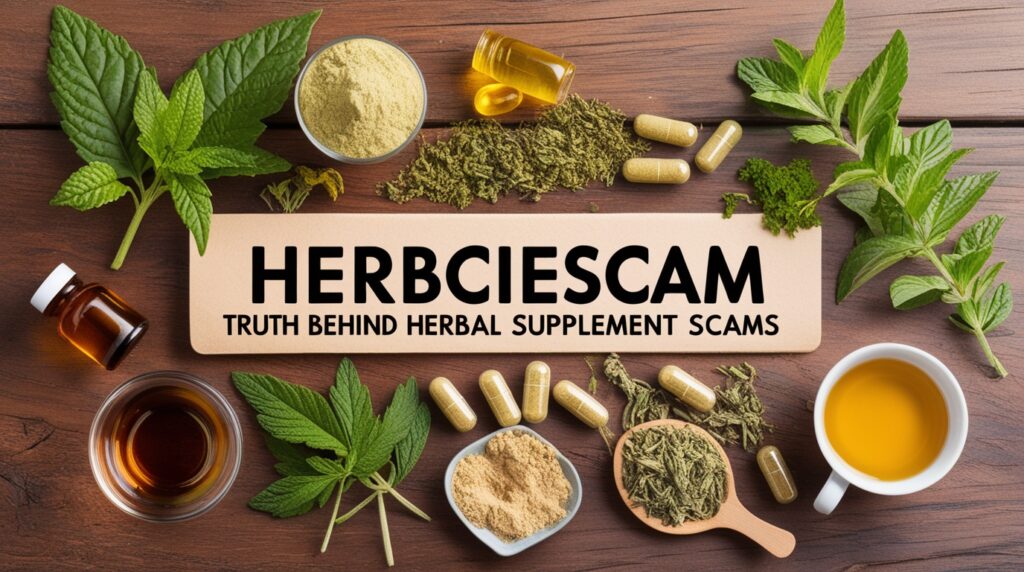In recent years, the herbal supplement industry has exploded in popularity, with many consumers turning to natural remedies for health and wellness. However, this surge in demand has also led to a rise in fraudulent practices and scams, collectively referred to as “Herbciepscam.” This article aims to explore the phenomenon of Herbciepscam, its implications for consumers, and how to navigate the complex world of herbal supplements safely and effectively.
Understanding Herbal Supplements
What Are Herbal Supplements?

Herbal supplements are products derived from plants that are used to promote health and well-being. They can come in various forms, including capsules, powders, teas, and tinctures. Many people use herbal supplements to address specific health concerns, such as anxiety, digestive issues, or inflammation.
The Appeal of Herbal Remedies
The growing interest in herbal supplements can be attributed to several factors:
- Natural Alternatives: Many consumers prefer natural remedies over synthetic pharmaceuticals, believing they are safer and less likely to cause side effects.
- Cultural Traditions: Herbal medicine has been practiced for centuries in various cultures, leading to a wealth of knowledge and anecdotal evidence supporting its use.
- Increased Awareness: As people become more health-conscious, they seek out alternative therapies to complement their wellness routines.
The Rise of Herbciepscam

Defining Herbciepscam
Herbciepscam refers to fraudulent practices associated with the marketing and sale of herbal supplements. These scams can take many forms, including misleading advertising, false claims about product efficacy, and deceptive pricing strategies. The term “Herbciepscam” encompasses a wide range of unethical practices that exploit consumers’ trust and desire for natural remedies.
Common Types of Herbciepscam
- False Claims: Many companies make exaggerated or unfounded claims about the health benefits of their products. For example, a supplement may be marketed as a “miracle cure” for chronic diseases without any scientific evidence to support such claims.
- Misleading Marketing: Some companies use deceptive advertising tactics, such as fake testimonials, before-and-after photos, and misleading labels, to entice consumers into purchasing their products.
- Subscription Traps: Certain companies lure customers with free trials or low-cost introductory offers, only to enroll them in expensive subscription services without their consent.
- Counterfeit Products: The rise in demand for herbal supplements has led to an increase in counterfeit products that may contain harmful ingredients or lack the purported benefits.
- Lack of Regulation: The herbal supplement industry is not as strictly regulated as pharmaceuticals, making it easier for unscrupulous companies to operate without oversight.
The Impact of Herbciepscam on Consumers

Health Risks
One of the most significant concerns surrounding Herbciepscam is the potential health risks posed to consumers. Many herbal supplements are not subject to the same rigorous testing and regulation as pharmaceutical drugs, leading to concerns about safety, efficacy, and quality. Consumers may unknowingly ingest harmful substances or experience adverse reactions due to undisclosed ingredients.
Financial Consequences
In addition to health risks, consumers may also face financial consequences as a result of Herbciepscam. Many individuals fall victim to subscription traps or end up spending large sums of money on ineffective products. The emotional toll of being scammed can also lead to feelings of frustration, betrayal, and distrust in the health and wellness industry.
Erosion of Trust
The prevalence of scams in the herbal supplement market has contributed to a growing skepticism among consumers. As more individuals share their negative experiences online, the overall trust in herbal remedies may decline, potentially overshadowing the benefits of legitimate products. This erosion of trust can have far-reaching implications for both consumers and reputable companies in the industry.
Navigating the Herbal Supplement Market
Research and Education
To protect themselves from Herbciepscam, consumers must prioritize research and education. Here are some essential steps to consider:
- Verify Claims: Look for scientific studies or clinical trials that support the claims made by a product. Reputable companies often provide references to research on their websites.
- Check Ingredients: Familiarize yourself with the ingredients in herbal supplements. Be cautious of products with long ingredient lists or those that contain unfamiliar substances.
- Read Reviews: Seek out independent reviews and testimonials from verified customers. Be wary of overly positive reviews that may seem fabricated.
- Consult Healthcare Professionals: Before starting any new supplement regimen, consult with a healthcare professional, especially if you have pre-existing health conditions or are taking medications.
Choosing Reputable Brands
When selecting herbal supplements, it is crucial to choose reputable brands that prioritize transparency and quality. Look for companies that:
- Provide third-party testing results to verify the purity and potency of their products.
- Clearly label their products with ingredient lists, dosage recommendations, and potential side effects.
- Have a solid reputation within the health and wellness community, supported by positive reviews and endorsements from healthcare professionals.
FAQs About Herbciepscam
What should I do if I suspect I’ve been scammed?
If you believe you’ve fallen victim to a herbal supplement scam, take the following steps:
- Stop Using the Product: Discontinue use immediately to avoid potential health risks.
- Document Everything: Keep records of your purchase, including receipts, emails, and any correspondence with the company.
- Report the Scam: File a complaint with consumer protection agencies, such as the Federal Trade Commission (FTC) in the U.S., or your local consumer protection office.
- Seek Medical Advice: If you experience adverse effects, consult a healthcare professional promptly.
Are all herbal supplements scams?
No, not all herbal supplements are scams. Many reputable companies produce high-quality products backed by scientific research. However, consumers must remain vigilant and conduct thorough research to distinguish between legitimate products and scams.
How can I identify a reputable herbal supplement brand?
Look for brands that are transparent about their sourcing, manufacturing processes, and ingredient quality. Reputable companies often provide third-party testing results, clear labeling, and have positive reviews from verified customers.
Is it safe to use herbal supplements?
While many herbal supplements can be safe and beneficial, it is essential to consult with a healthcare professional before starting any new supplement, especially if you have existing health conditions or are taking medications. Additionally, be cautious of products with unverified claims or those from unknown sources.
What are the legal regulations surrounding herbal supplements?
In many countries, herbal supplements are classified as dietary supplements and are subject to less stringent regulations than pharmaceuticals. This lack of regulation can lead to variations in product quality and safety. Consumers should be aware of the regulatory environment in their region and choose products from reputable brands.
Conclusion
The rise of Herbciepscam highlights the importance of consumer awareness and education in the herbal supplement market. By understanding the potential risks and taking proactive steps to research products and companies, consumers can make informed decisions and protect themselves from scams. While herbal supplements can offer numerous health benefits, it is crucial to approach them with caution and skepticism, ensuring that the products you choose are safe, effective, and backed by credible evidence.










